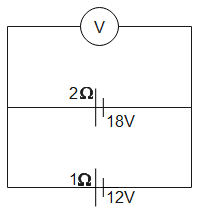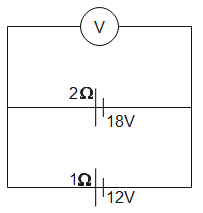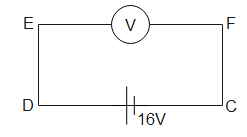Question
Question: Two batteries of emf \(18V\) and internal resistance \(2\Omega \) and the other of emf \(12V\) and i...
Two batteries of emf 18V and internal resistance 2Ω and the other of emf 12V and internal resistance 1Ω are connected as shown. Voltmeter V will record the reading of:

(A).18V
(B). 30V
(C). 14V
(D). 15V
Solution
The figure shows two batteries and a voltmeter connected in parallel. A voltmeter is a device which is used to calculate the potential drop between two points. As the batteries are connected in parallel, they are in parallel combination. We can substitute values of voltage and internal resistance in the formula for equivalent potential in parallel combination of batteries and the equivalent potential is equal to the reading in voltmeter.
Formulas used:
V=r1+r2E1r2+E2r1
Complete answer:
According to the Ohm’s law,
R=IV
Here, R is the resistance
V is the potential in the circuit
I is the current in the circuit

In the figure given, the two batteries and the voltmeter are connected in parallel, therefore, the potential drop in each arm will be the same. Since the batteries are connected in a parallel combination, the voltage of the resultant battery can be calculated as
V=r1+r2E1r2+E2r1
Here, E1 and E2 are the potentials of the batteries
r1 and r2 are their internal resistances
Given, E1=18V,r1=2Ω and E2=12V,r2=1Ω
Substituting given values in the above equation, we get,
V=2+118×1+12×2⇒V=14V

The resultant circuit will be as above the potential of resultant battery will be 14V. Since the voltmeter is connected in parallel with the battery, its potential will be the same as that of the battery.
Therefore, the reading of voltmeter will be 14V.
Hence, the correct option is (C).
Note:
The batteries can be connected in two combinations; series and parallel and the equivalent battery is the combination of all batteries. In series, the current is the same while in parallel, the voltage is the same that is why the ammeter is connected in series while the voltmeter is connected in parallel.
